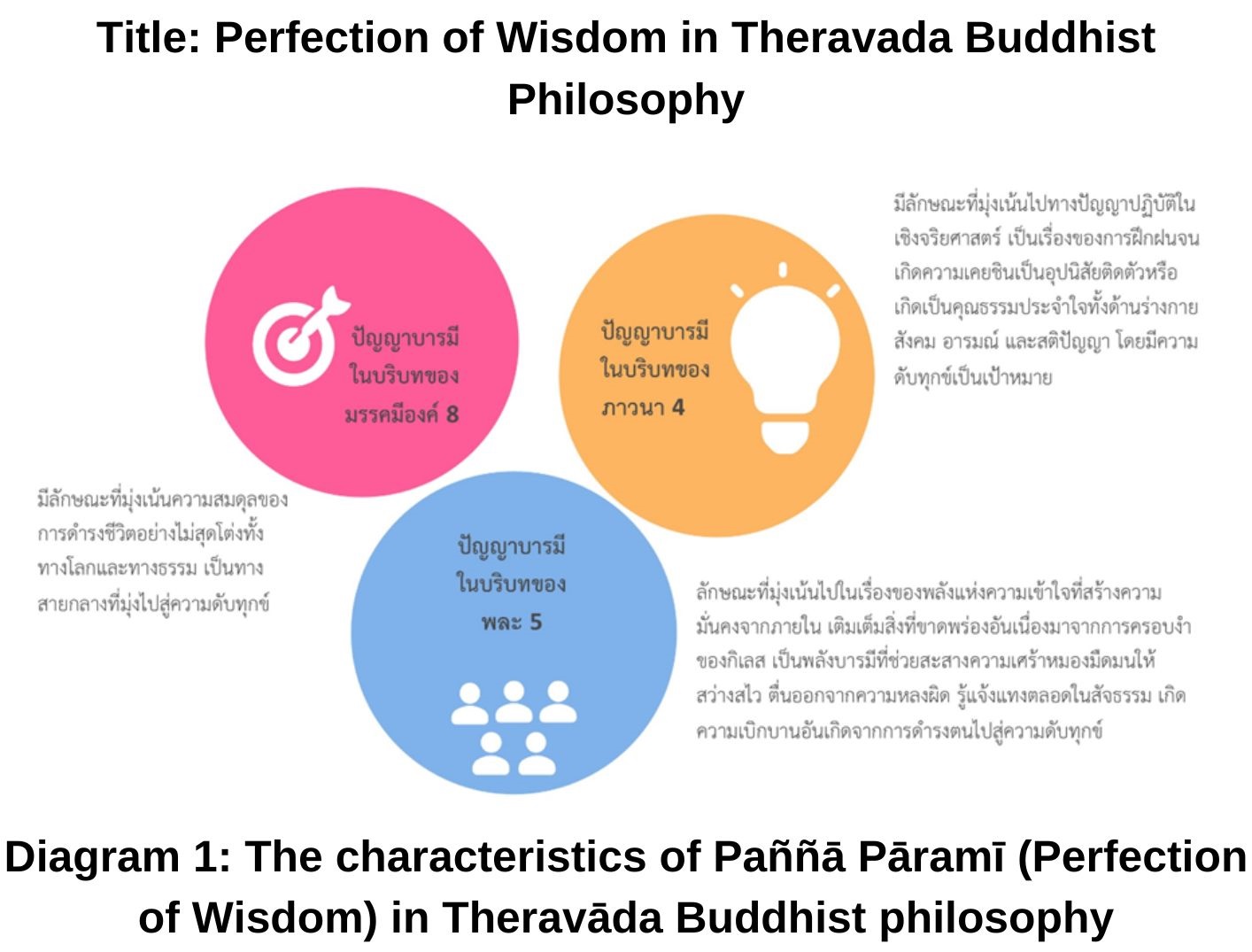Perfection of Wisdom in Theravada Buddhist Philosophy
Keywords:
Wisdom, Perfection, Perfection of Wisdom, Theravada Buddhist PhilosophyAbstract
This article aims to analytically study the Perfection of Wisdom in Theravada Buddhist philosophy. The study found that : 1) In the context of the Noble Eightfold Path, the Perfection of Wisdom emphasizes a balanced way of life, avoiding extremes in both worldly and spiritual matters, representing a middle path that leads to the cessation of suffering. 2) In the context of the Fourfold Development, the Perfection of Wisdom focuses on practical wisdom within ethics, involving repeated practice until it becomes a habitual quality or virtue ingrained in body, social interactions, emotions, and intellect, with the cessation of suffering as the ultimate goal. 3) In the context of the Five Powers, the Perfection of Wisdom emphasizes the power of inner understanding that creates inner stability, filling the gaps caused by the influence of defilements. This power of wisdom clears away darkness and sorrow, awakens one from delusion, and brings insight into the truth, leading to a joyful state that guides one toward the end of suffering. The development of oneself was aimed at achieving a good quality of life, with confidence in accordance with nature, perseverance, mindfulness, determination, and wisdom in solving problems and continuously improving oneself.
References
ชิสา กันยาวิริยะ. (2567). หลักภาวนา 4 เพื่อการพัฒนาคุณภาพชีวิต. วารสารสถาบันพอดี, 1(3), 9-20.
ปราโมช น้อยวัฒน์. (2549). พุทธการกธรรมทีปนี. สมุทรปราการ : ชมรมกัลยาณธรรม.
พระครูปทุมภาวนาจารย์ วิ. และเสริมศิริ อัครพุฒิพันธ์. (2562). หลักภาวนา 4 กับการพัฒนาปรีชาเชิงอารมณ์ของวัยรุ่นไทยในสังคมยุคดิจิทัล. วารสารพุทธจิตวิทยา, 4(1), 129-142.
พระธรรมปิฎก (ป.อ. ปยุตโต). (2543). พุทธธรรม ฉบับปรับปรุงและขยายความ. (พิมพ์ครั้งที่ 4). กรุงเทพฯ : โรงพิมพ์มหาจุฬาลงกรณราชวิทยาลัย.
พระธรรมวิสุทธิกวี (พิจิตร ฐิตวณฺโณ). (2559). การพัฒนาจิต. กรุงเทพฯ : สร้างสรรค์บุ๊ค
พระปลัดสมควร อธิปุญฺโญ. (2560). ศึกษาวิเคราะห์ปัญญาบารมีในฐานะเป็นปัจจัยเข้าถึงคุณธรรม ตามหลักพระพุทธศาสนาเถรวาท. วารสารบัณฑิตศึกษาปริทรรศน์, 13(2), 64-75.
พระพรหมคุณาภรณ์ (ป. อ. ปยุตฺโต). (2547). หลักแม่บทของการพัฒนาตน. (พิมพ์ครั้งที่ 15). กรุงเทพฯ : โรงพิมพ์มหาจุฬาลงกรณราชวิทยาลัย.
_________. (2552). พุทธธรรมฉบับปรับปรุงและขยายความ. (พิมพ์ครั้งที่ 11). กรุงเทพฯ : โรงพิมพ์มหาจุฬาลงกรณราชวิทยาลัย.
พระพรหมโมลี (วิลาศ ญาณวโร, ป.ธ.9). (2545). มุนีนาถทีปนี. กรุงเทพฯ : ดอกหญ้า.
พระสมุห์บุญฤทธิ์ มหาปุญโญ (ศรีวิชัย). (2563). หลักธรรมพละ 5 (ศรัทธาพละ) กับการเกื้อหนุนการปฏิบัติพระกรรมฐาน. Journal of Roi Kaensarn Academi, 5(2), 167-175.
มหาจุฬาลงกรณราชวิทยาลัย. (2539). พระไตรปิฎกภาษาไทย ฉบับมหาจุฬาลงกรณราชวิทยาลัย. กรุงเทพฯ : โรงพิมพ์มหาจุฬาลงกรณราชวิทยาลัย.
สมเด็จกรมพระปรมานุชิตชิโนรส. (2505). พระปฐมสมโพธิกถา. กรุงเทพฯ : โรงพิมพ์การศาสนา,
สมเด็จพระมหาสมณเจ้า กรมพระยาวชิรญาณวโรรส. (2529). สารานุกรมพระพุทธศาสนา. กรุงเทพฯ : โรงพิมพ์มหามกุฏราชวิทยาลัย.
สุนทร ณ รังสี. (2552). พุทธปรัชญาจากพระไตรปิฎก. (พิมพ์ครั้งที่ 4). กรุงเทพฯ : โรงพิมพ์แห่งจุฬาลงกรณ์มหาวิทยาลัย.
สุรพล ไกรสราวุฒิ. (2552). คู่มือปัญญาในพระพุทธศาสนา. กรุงเทพฯ : โรงพิมพ์แห่งจุฬาลงกรณ์มหาวิทยาลัย.
สุรีย์ มีผลกิจ. (2541). พระพุทธประวัติ. กรุงเทพฯ : บริษัท คอมฟอร์ม จำกัด.

Downloads
Published
How to Cite
Issue
Section
License
Copyright (c) 2024 Institute of Sufficiency Journal

This work is licensed under a Creative Commons Attribution-NonCommercial-NoDerivatives 4.0 International License.



